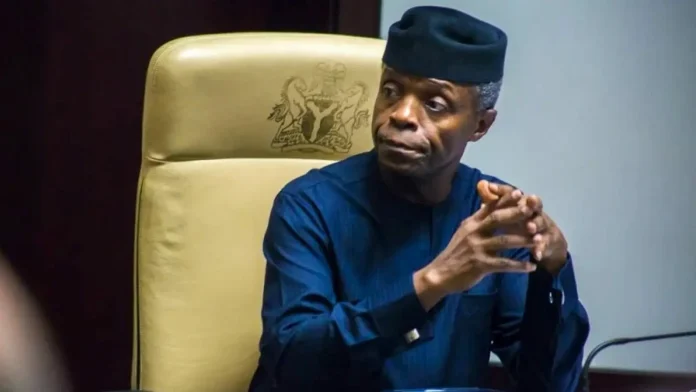The current global energy transition is both an opportunity for the preservation of the earth and a vehicle for unlocking the development potential and livelihoods of millions of people, especially those in developing countries.
However, the transition must also be fair and sensitive to Africa’s peculiarities and priorities, according to Vice President Yemi Osinbajo, SAN, when he spoke virtually at the 2022 Standard Bank Climate Summit themed, “Africa’s Path to Carbon Neutrality.”
Prof. Osinbajo focused on “how to manage the energy transition to net-zero in the context of Africa’s unique challenges, such as energy poverty.”
“The current energy transition is an opportunity like none other for the preservation of the planet, but it can also be a vehicle for unlocking the development potential and livelihoods of millions of people. There is no reason why we cannot have both,” the VP stated.
He said the global community must account for diverse realities and accommodate various pathways to net-zero, “particularly for African nations which need financial and technical support as well as the flexibility to develop as swiftly as possible. This will ensure a fair and balanced energy transition that leaves no one behind.
“How we manage the global energy transition must be sensitive to Africa’s priorities. The global energy transition must place energy access for both consumptive and productive uses at the heart of climate action,” he added.
The Vice President however noted that “to ensure a global energy transition that is favourable to us, African nations need to engage more critically and vocally on this matter.”
Making reference to Nigeria’s Energy Transition Plan as a leading light, Prof. Osinbajo said “the value of having a nation-specific, data-driven plan as the basis of our activities and engagements cannot be overemphasized,” adding that “the plan provides a clear financial estimate for the achievement of Nigeria’s energy access and transition goals.”
“Nigeria’s Energy Transition Plan finds that an additional $10 billion over business as usual is required annually till 2060 to shift the entire economy to a net-zero pathway. We hope to see more of such plans on the continent,” the VP noted.
Citing another example of efforts to have a pan-African position on energy transition, Prof. Osinbajo said “this is underway with certain countries including Nigeria developing and signing on to the Kigali Communiqué which came out of the Sustainable Energy for All Forum in June, and outlines principles for a just and equitable energy transition.”
According to him, “we must take ownership of our transition pathways and design climate-sensitive strategies that address our growth objectives. We must clearly and thoroughly articulate our priorities, strategies and needs.”
Justifying Africa’s stand for a just and balanced energy transition, the Vice President noted that “though Africa’s current unmet energy needs are huge, future demand will be even greater as populations expand, people move into the middle class and rapid urbanization continues.”
Specifically, the VP observed that in 2020, “Sub-Saharan Africa had 568 million people without access to electricity. This represents more than three-quarters of the world’s total unelectrified population. On the other hand, most developed nations have 100% energy access. Surely, the race to net-zero must not leave people in the dark.
“Also, Sub-Saharan Africa remains the only region in which the number of people without access to clean cooking fuels and technologies is rising. 19 of the 20 countries with lowest clean cooking access rates are in Africa.”
Prof. Osinbajo argued that “limiting the development of gas projects, as a critical energy transition pathway for Africa, violates enshrined principles of equity and justice, and poses dire challenges for African nations while making an insignificant dent in global emissions.”
He said “Africa has contributed the least of any global region to greenhouse gas emissions and currently emits under 4% of global emissions. Under no plausible scenario are Africa’s emissions a threat to global climate targets. Unfounded predictions should not serve as excuses to limit our energy technology options.
“Limiting financing of gas projects for domestic use in Africa would pose a severe challenge to the pace of economic development, delivery of electricity access and clean cooking solutions, and the scaleup and integration of renewable energy into the energy mix.”
On financing energy transition, Prof. Osinbajo said “a balanced and just approach to the energy transition recognizes that finance is key. Lack of access to finance remains the biggest challenge for accelerating action on energy access and climate goals in Africa.”
The VP restated the call on developed countries to bridge the disparity in energy investments, noting that “of the $2.8 trillion invested in renewable energy from 2000 to 2020, only about 2%, $60 billion, came to Africa.”
“It has been estimated by the International Energy Agency that Africa will need around $133 billion annually in clean energy investment to meet our energy and climate goals between 2026 and 2030.
The Standard Bank Group which hosted the event on Tuesday, has itself committed to achieving net zero carbon emissions from its own operations for newly built facilities by 2030, for existing facilities by 2040, and from its portfolio of financed emissions by 2050.
Laolu Akande




